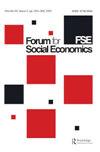The Death of Neoliberalism or a Mere Camouflage? Polanyian Countermovement in Hungary & Poland
IF 0.6
Q4 ECONOMICS
引用次数: 2
Abstract
Abstract This article aims to assess the causes of the recent emergence of Polanyian countermovement in Hungary and Poland and their attitudes towards neoliberal orthodoxy prevailing in post-1989 socioeconomic development. This article is structured as follows. Firstly, we approximate the fundaments of neoliberal thinking through the inner workings of Vanberg and Hayek. Secondly, we incorporate the Polanyian framework, focusing primarily on the concept of a countermovement. Lastly, we assess the development of neoliberal features in the political economy of Hungary and Poland, trying to position the emergence of Fidesz and Prawo i Sprawiedliwość (Law and Justice, PiS) into this development. We argue that both countermovements emerged as a result of general discontent with neoliberal development. Whilst the political economy of Orbán’s regime remains critical of neoliberalism mainly in the rhetoric, camouflaging neoliberal orthodoxy with developmental rhetoric, the conservative governments in Poland made a substantial shift from the neoliberal orthodoxy following their rise to power in 2015.新自由主义之死还是伪装?匈牙利和波兰的波兰反运动
本文旨在评估匈牙利和波兰最近出现的波兰反运动的原因,以及他们对1989年后社会经济发展中盛行的新自由主义正统的态度。本文的结构如下。首先,我们通过范伯格和哈耶克的内部运作来近似新自由主义思想的基础。其次,我们纳入波兰框架,主要关注反运动的概念。最后,我们评估了匈牙利和波兰政治经济中新自由主义特征的发展,试图将青民盟(Fidesz)和Prawo i Sprawiedliwość(法律与正义,PiS)的出现定位于这一发展。我们认为,这两种反运动都是对新自由主义发展普遍不满的结果。虽然Orbán政权的政治经济学仍然主要在修辞上批评新自由主义,用发展的修辞来掩盖新自由主义的正统,但波兰的保守派政府在2015年上台后,从新自由主义的正统中做出了重大转变。
本文章由计算机程序翻译,如有差异,请以英文原文为准。
求助全文
约1分钟内获得全文
求助全文

 求助内容:
求助内容: 应助结果提醒方式:
应助结果提醒方式:


